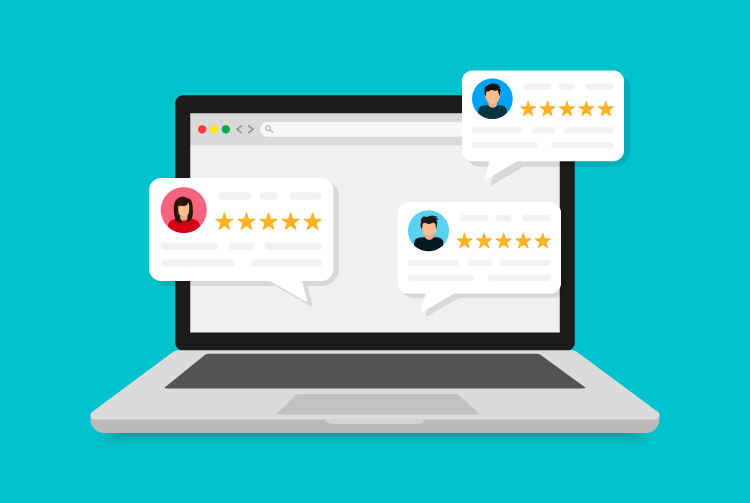
With Google, Bing, Yelp, Glassdoor, and many, many more sites that facilitate ratings, the probability of someone sharing their opinion about your business online is right around 100%. No matter what you do, you just can’t get away from reviews. Thing is, reviews can have a major impact on your organization’s reputation, even if they’re irrelevant, false, or unspecific. That knee-jerk reaction to a star rating is instinctual for consumers, decision-makers, and other viewers of your information online. Here are some stats on online reviews that can help you understand their importance across multiple contexts:
- Reviews are not just a consumer thing. B2B buyers check them too. In fact, 92% of B2B buyers get information and recommendations from online review sites to help support purchasing decisions.1
- For younger adults, word of mouth has been dethroned—or, at the very least, has serious competition. 91% of adults aged 18-34 put as much trust in online reviews as personal recommendations from friends and family.2
- Online reviews impact almost every potential customer in your market. In fact, only 2% of consumers reported not reading online reviews for local businesses.2
- The biggest review sites have a strong hold on the review marketplace. 88% of the distribution of reviews on the internet can be attributed to just 4 sites: Google (73%), Yelp (6%), Facebook (3%) and TripAdvisor (3%).3
- Google is (obviously) the review source of choice, with 63% of users saying they’ll check Google reviews before visiting a business location.3
- Company reviews help prove that employee and customer experience go hand in hand. A 2019 Glassdoor study found that each 1-star improvement in an employer’s Glassdoor company rating out of 5 is associated with a statistically significant 1.3-point increase in customer satisfaction out of 100.4
- Reviews are a positive feedback loop. The more you get and respond to, the more likely you are to get seen—and get more reviews down the road. Good reviews and business interactions on Google improve your organic search visibility.5
- No negative reviews might make users suspicious and can keep them from converting. In contrast, a bad review can lead someone to spend 5x longer on your site and makes the other reviews seem more trustworthy.6
- You can lead a horse to water, but you can’t make it give you a review…most of the time. That is to say, asking for reviews only has a minor effect on customer behavior. Only 16% of customers say they’d “very likely” review a business when asked or after receiving a request via email/text message.2
- Review fraud is a growing issue, and certain geographical areas have more fake review issues for local business than others. That may put local users on their guard. As of 2023, South Florida (specifically the Miami and Ft. Lauderdale metro area) is the capital of fake reviews, with a review fraud rate of 9.7%.7
Are you struggling to manage negative or fraudulent reviews, or wondering how you can make online reviews work within your overall strategy? As a full-service advertising agency, bfw can recommend a range of solutions – and leverage our deep experience and knowledge of best practices – to help you get the results you’re looking for and support your brand’s online presence. Have a chat with us to learn how our South Florida-based team can partner with you.
References:
- https://customergauge.com/blog/the-ultimate-guide-to-b2b-reviews
- https://www.brightlocal.com/research/local-consumer-review-survey/
- https://www.reviewtrackers.com/reports/online-reviews-survey/
- https://www.glassdoor.com/research/app/uploads/sites/2/2019/08/GD-Customer-Employee-Satisfaction-Report-2019-Final-2-2.pdf
- https://support.google.com/business/answer/7091
- https://blog.reevoo.com/ebook-bad-reviews-good-business/
- https://www.prweb.com/releases/study_67_of_us_consumers_say_fake_online_reviews_a_growing_problem/prweb18295984.htm